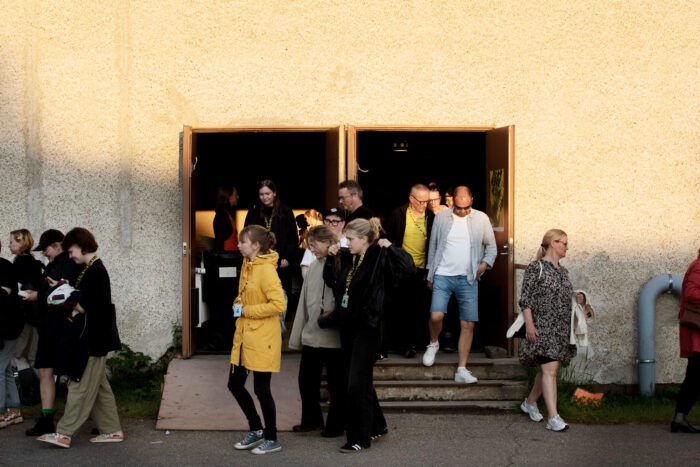The final festival day, Sunday, kicked off after a night packed with screenings. The festival audience could still enjoy numerous screenings, two morning discussions, the legendary Film Panel, and audience-requested reruns until midnight.
The final morning discussions featured Turkish Aslı Özge and Norwegian Dag Johan Haugerud. Özge shared with the audience how cinema provided her solace during a difficult time when her mother was diagnosed with cancer and how she has explored both her old and new homelands in her films. Haugerud revealed that Leos Carax’s Mauvais Sang inspired him to pursue film studies and discussed the significant role Oslo plays in his films.
In Lapinsuu, Sunday morning started with Selma Vilhunen’s Four Little Adults (2023), preceded by actor Oona Airola discussing the film. Four Little Adults is a film about love and relationships, highlighting polyamorous relationships in a fresh and new way. According to Airola, the film has been praised for positively portraying polyamorous relationships. Airola also shared that she became aware of societal misogynistic thoughts within herself while exploring her character and started working on them.
In the afternoon, MSFF hosted the world premiere of Anssi Mänttäri – Suomielokuvan, a documentary about one of the festival’s founders. Directors Tero Hiltunen and Sampsa Huttunen, along with composer Perttuli Arhola, attended the screening at Cinema Kitinen.
In the chilly Sunday afternoon, the festival’s traditional Leffaraati (Film Panel) began at the School, where a potato was placed on Elvis’s face. Much like the television show Levyraati, a panel reviewed a selection of works – in this case, short films from various decades. The panel was lead by actor and professor Elina Knihtilä, who had received a long list of instructions for the job from the previous host, actor Ville Virtanen, including, “Don’t act like a host, be a host!” The panel consisted of journalist Iida Simes, directors Heikki Kujanpää and Katja Gauriloff, and publisher and journalist Tuomas Rantanen.
The panelists and the audience at the School watched six Finnish short films, which were kept secret beforehand. Emotions and scores varied widely as the screen showcased everything from a lumberjack’s tears, animated flowers, a Lenin statue, and a parking inspector’s longing for love. The panel’s interpretations and associations ranged from concentration camps and navigating the labyrinths of patriarchy to sexual awakening. The winner was Veli Granö and Milja Viita’s The King (2024), which led the panel to ponder the deeper meaning of potatoes through Rauli “Badding” Somerjoki and Elvis’ appearances in Somero potatoes.
The festival concluded, as usual, with re-run screenings voted on by the audience. The audience-choice screening at Lapinsuu featured Virpi Suutari’s Once Upon a Time in a Forest (2024), a film about forest activists, along with Mia Halme’s delightful short film Fabulous Cow Ladies (2024). French Anaïs Tellene’s acclaimed debut film The Dreamer (2023) also became an audience favorite, earning a spot as the last screening at Cinema Kitinen. At the School, the festival closed with Paul Wendkos’ surf film Gidget Goes Hawaiian (1961), a film that charmed the Sodankylä audience with its appropriately mosquito-related Finnish title Hyttynen lähtee Havaijille. Olaf Möller, who curated the film for his master class focusing on beach films, had already left Sodankylä, but Petteri Kalliomäki from the National Audiovisual Institute opened the screening by sharing Möller’s regards with the audience.
Image: Liisa Huima
